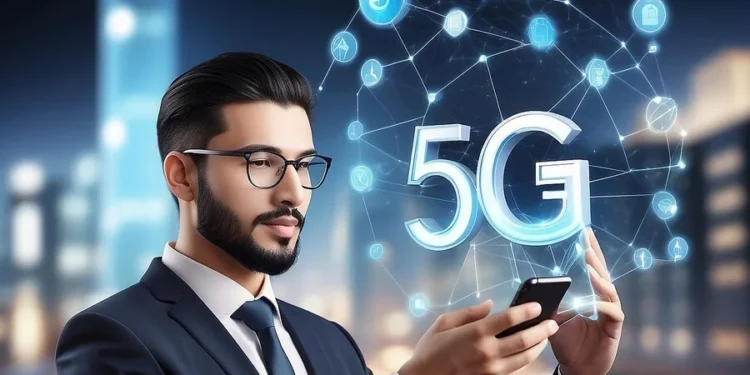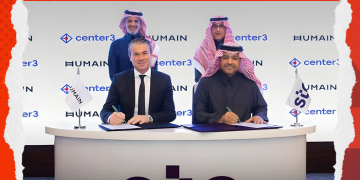The rollout of 5G technology across the Middle East is revolutionizing multiple industries, creating a new wave of innovation that is reshaping the region’s economy. Known for its high-speed, low-latency, and massive connectivity capabilities, 5G is not just improving internet access—it’s transforming critical sectors such as healthcare, education, logistics, and more. As countries like the UAE, Saudi Arabia, and Qatar continue to lead in the adoption of 5G, regional companies are pioneering new applications of this game-changing technology.
The 5G Revolution: A Game Changer for the Middle East
5G networks promise data transmission speeds up to 100 times faster than 4G, with minimal delays and the capacity to connect billions of devices simultaneously. This next-gen connectivity is opening up possibilities across various industries, helping organizations leverage technologies like the Internet of Things (IoT), Artificial Intelligence (AI), and Augmented Reality (AR) for better efficiency, accuracy, and productivity.
Let’s explore the impact of 5G in three key sectors: healthcare, education, and logistics, with case studies from regional companies leading the charge.
- Healthcare: Revolutionising Remote Care and Precision Medicine
The healthcare industry in the Middle East is undergoing a transformation with the integration of 5G technology, particularly in the UAE and Saudi Arabia. With its ultra-fast speeds and low latency, 5G is enabling remote healthcare services, real-time patient monitoring, and telemedicine at levels that were previously unattainable.
Case Study: Mediclinic Middle East
Mediclinic, one of the UAE’s leading healthcare providers, has been at the forefront of using 5G to enhance patient care. Through 5G-powered telemedicine, the hospital chain can conduct high-definition video consultations without lag, ensuring that remote patients, especially in rural or underserved areas, receive timely diagnoses and care.
Additionally, 5G-enabled IoT devices are allowing doctors to monitor patients’ vital signs in real-time. This data, streamed to healthcare providers instantly, helps in early detection of medical issues, ensuring faster intervention and improved patient outcomes.
Impact:
Remote Surgeries: Surgeons can now perform complex surgeries remotely with the help of robotic systems, where 5G ensures real-time precision control and minimal delay, increasing access to world-class medical expertise across the region.
Wearable Devices: With 5G, wearable health monitors that collect and transmit patient data (such as heart rate, blood pressure, and oxygen levels) in real-time are becoming more advanced, contributing to personalized healthcare and proactive treatment plans.
- Education: Enhancing Digital Learning and Immersive Experiences
The education sector in the Middle East, particularly in the UAE, has embraced digital transformation, and 5G is playing a pivotal role in enhancing e-learning and virtual classroom experiences. With faster internet speeds and stable connections, 5G is making education more accessible, interactive, and immersive for students, regardless of their physical location.
Case Study: Hamdan Bin Mohammed Smart University (HBMSU)
HBMSU, based in Dubai, has integrated 5G-enabled Virtual Reality (VR) and Augmented Reality (AR) technologies into its online courses. These tools allow students to engage in virtual laboratories and simulations that provide hands-on learning experiences without the need to be physically present.
Furthermore, 5G’s low-latency capabilities make video conferencing more interactive and seamless, ensuring that online classes mimic the dynamism of in-person lectures, with live feedback, collaboration, and student participation.
Impact:
AR/VR Learning: 5G enhances virtual learning environments by supporting immersive technologies like AR and VR. Students can experience lifelike simulations in fields like medicine, engineering, and architecture, providing practical learning experiences that prepare them for real-world challenges.
Equal Access: In remote or underserved regions, 5G ensures students have access to high-quality digital education, bridging the gap between urban and rural learners. Educational resources such as e-books, lectures, and research databases are now more accessible, even in remote locations.
- Logistics: Streamlining Operations with Real-Time Connectivity
Logistics and supply chain management are critical sectors in the Middle East, especially given the region’s strategic location as a global trade hub. 5G is enabling real-time tracking, automation, and data analytics that are transforming how companies manage inventory, transportation, and delivery.
Case Study: Aramex
Aramex, a leading logistics provider in the region, has integrated 5G-powered IoT sensors into its supply chain operations to track shipments in real-time, optimizing delivery routes and improving supply chain transparency. The company uses 5G to ensure that every step of the delivery process is monitored in real-time, reducing delays and ensuring faster deliveries to customers.
The introduction of 5G drones for delivery has also been a game-changer. These drones are capable of carrying small packages and delivering them across urban and rural areas efficiently, reducing delivery times and human intervention.
Impact:
Automation and AI: 5G enables automated warehouses where robots and AI systems handle goods more efficiently, reducing human error and speeding up inventory management. This transformation is critical as logistics companies in the Middle East look to increase efficiency while reducing operational costs.
Real-Time Fleet Management: With 5G-connected vehicles, logistics companies can monitor their fleets in real-time, allowing them to manage vehicle performance, fuel consumption, and driver behavior. This leads to better route planning, fuel savings, and timely deliveries.
A New Era of Connectivity and Innovation
The deployment of 5G across the Middle East is unlocking unprecedented opportunities across various sectors, including healthcare, education, and logistics. Companies like Mediclinic, Hamdan Bin Mohammed Smart University, and Aramex are leading the way in using 5G to deliver faster, more efficient services that are improving quality of life and business operations in the region.
As 5G networks continue to expand, more industries will experience the benefits of this revolutionary technology. From smart cities to connected industries, 5G is not only transforming individual sectors but is also laying the groundwork for the Middle East’s digital future, driving innovation and positioning the region as a leader in global technology transformation.














